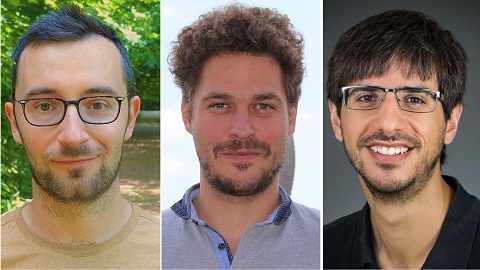Three ICTA-UAB researchers awarded an ERC Starting Grant
Three ICTA-UAB researchers have been awarded a Starting Grant from the European Research Council (ERC) to develop projects on sustainable mobility, indigenous environmental knowledge, and the role of the Internet in the protection of the natural environment. Together they will receive a total of 4.5 million euros.

ICTA-UAB researchers Álvaro Fernández-Llamazares, Johannes Langemeyer and Oriol Marquet are three of the 400 young scientists and scholars across Europe who will receive ERC support to develop their research through their own projects and research teams over the next five years. The competition attracted over 2,696 proposals, which were reviewed by panels of renowned researchers from around world. The overall success rate was 15% and the grants are expected to create more than 2,600 jobs for postdoctoral fellows, PhD students and other staff at the host institutions.
The project "Assessing long-term changes in Indigenous Environmental Knowledge", led by Álvaro Fernández-Llamazares, researcher at ICTA-UAB and the UAB Department of Animal Biology, Plant Biology and Ecology (BABVE), will analyse Indigenous Environmental Knowledge (IEK) systems to determine how they change over time and the ecological impacts associated with such changes. Some studies suggest the existence of processes of erosion, adaptability and resilience of this knowledge Indigenous People have about the natural environment, but lack data on these possible changes over long periods of time and their knock-on effects on biodiversity. In partnership with the Tsimane' Indigenous Peoples of the Bolivian Amazon, Fernández-Llamazares will systematically collect the ethnobiological data needed to analyse how the loss of collective memory and knowledge impinges negatively on biodiversity conservation. The project’s ground-breaking nature lies on its focus not only on changes in IEK content (e.g., plant uses), but also on the contexts for such changes (e.g., biocultural landscapes), and their interwoven ecological impacts (e.g., forest loss).
The project "Fostering Internet-based Values of the Environment (BIG-5)", led by Johannes Langemeyer, will highlight the role of the Internet and social networks in building new ways of experiencing nature, a practice that is in decline. There is a belief that this decline leads to a dwindling appreciation of nature and consequently less commitment to environmental stewardship. Langemeyer argues that the Internet becomes an enabler of experiences in nature, as well as creating natural values and fostering environmental stewardship. The BIG-5 project will introduce Digital Relational Values (DRVs) as fundamental values in virtual communities, triggered by indirect experiences of nature. The project will trace these values across five landscape types, five large social media networks, and in five European languages through qualitative and quantitative (big data) approaches in an inductive-deductive manner.
Oriol Marquet, researcher from ICTA-UAB and the UAB Department of Geography, is responsible for the project "The active travel backlash paradox: opposition and acceptability determinants of built environment-based sustainable travel interventions" which will analyse the reasons why some of the ambitious public proposals aimed at reducing car use and creating more sustainable, equitable and healthy transport systems have been met with strong opposition. At the same time, politicians around the world who have pushed for built environment-based travel demand policies have subsequently been vindicated by major re-election wins or better-than-expected election results. This would suggest the existence of an "active travel backlash paradox," one where loud opposition movements might be concealing substantial silent support towards measures that aim to transform the built environment to make it more walkable and cyclable.
The project will seek to validate the existence and better understanding of this paradox. To do so, it will use a multi-scale and multi-method design to be applied to eight transport-policy leading European cities. Using election data and geolocated data on land-use transformation, the project will be able to assess the associations between voting behaviour and built environment-based sustainable travel interventions. Combined with public opinion surveys and interviews with experts to understand the socio-economic, individual and contextual factors underlying acceptability/opposition towards these policies, they will be able to understand opposition causes, along with their spatial and social distribution. This will allow exploring much-needed future pathways towards efficient and widely accepted sustainable transport policies.